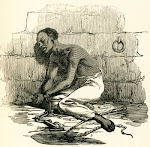
Paul Ryan's response to President Obama's State of the Union address, representing the official GOP response, stuck pretty close to Republicans stated, but not always practiced, view of government, and our Constitution:
We believe government's role is both vital and limited — to defend the nation from attack and provide for the common defense ... to secure our borders ... to protect innocent life ... to uphold our laws and Constitutional rights ... to ensure domestic tranquility and equal opportunity ... and to help provide a safety net for those who cannot provide for themselves.
We believe that the government has an important role to create the conditions that promote entrepreneurship, upward mobility, and individual responsibility.
We believe, as our founders did, that "the pursuit of happiness" depends upon individual liberty; and individual liberty requires limited government.
Limited government also means effective government. When government takes on too many tasks, it usually doesn't do any of them very well. It's no coincidence that trust in government is at an all-time low now that the size of government is at an all-time high.
The President and the Democratic Leadership have shown, by their actions, that they believe government needs to increase its size and its reach, its price tag and its power.
Under a Republican president and a Republican congress, Republicans violated what Ryan states is a "vital and limited" role of government--"to uphold our laws and Constitutional rights"--by spying on Americans and resorting to torture, as unreliable as that method is, when it comes to extracting actionable intelligence from detainees.
In addition, Some Republicans are considering a revisit of the Constitution, declaring that parts of it, the fourteenth amendment in particular, begged to be reconsidered, to undergo a new interpretation, in light of the many children of undocumented immigrants who have been born, and now reside in, the nation.
Although subject to Republicans pressing a "reinterpretation," Ryan's reference to providing "a safety net for those who cannot provide for themselves," startled, almost as much as the anachronistic placement of a cellphone at Lincoln's Gettysburg Address. It not only seemed out of place for a Republican, but clearly out of character. In the months ahead, I'm sure Ryan will be given many opportunities to expound on his meaning, given that Tea Party activists would like nothing better than to slash away at Social Security and Medicare, and end government's involvement in these two entitlements altogether by privatizing it.
In place of "promote the general welfare," Ryan particularized this part of the Preamble to the US Constitution by stating without ambiguity what he believes "general Welfare" to mean--nothing short of, and to the exclusion of all other, "entrepreneurship, upward mobility, and individual responsibility."
Entrepreneurship, and upward mobility is promoted, that is, corporate and business interest, but for individuals, "you're on your own."
Ryan's statement encapsulates Republicanism in a few words. And suggests why a commenter on another blog says he finds Republicans "objectionable": "[I]'s the content of the Republican character."
So there is after all a role for government, that of "promoter," one who actively supports and advocates. But that's not what is often heard from those on the Right. Ryan sees government's role more narrowly: to promote business and let "individuals" fend for themselves, to "create the conditions that promote", rather than support a government hands-on approach to governance and the promotion of the "general welfare."
We shouldn't be surprised at this reinterpretation of this portion of the Preamble (Among Tea Partiers and Republicans it's now commonplace.) as it was done to fit an ideological predisposition, and to round peg a square hole.
Yoking "individual liberty" to a "limited government" hasn't held up in practice, although Ryan sees one as promoting, and assuring, the other. A "limited government" didn't prevent the institution of slavery, or black codes, or promote women's suffrage, but an expanded government did.
A "limited government" didn't prevent the outsourcing of jobs to China, and other climes, prevent our economic disaster, that followed the repeal of the Glass-Steagall Act [1], and brought us too big to fail, nor did it prevent the death of miners at Massey Energy Co.'s Upper Big Branch mine [2], nor the Gulf of Mexico resembling a giant ink well, the result of gushing oil from a failed blow-out preventer, a massive oil spill that threatened and damaged a fragile coastal ecosystem for months, but an expanded government would have.
It appears that just the opposite is true regarding the size of government: Rather than praising the virtues of a "limited government," perhaps we should be extolling the virtues of an expanded government, one that works for, and on behalf of, the people, and not the army of corporate special interest that usually pursue their interests at the expense of the people.
It's not the "size of government" that has diminished the people's "trust in government," but the "all-time high" corruption that has infested the government for years, a corruption that is as pervasive as the size of government that Republicans say they wish to limit.
[1] "The repeal of the Glass–Steagall Act of 1933 effectively removed the separation that previously existed between Wall Street investment banks and depository banks and has been blamed by some for exacerbating the damage caused by the collapse of the subprime mortgage market that led to the Financial crisis of 2007–2010."
[2]"CHARLESTON, W.Va. — The U.S. coal industry had its deadliest year in nearly two decades in 2010, with much of the death toll stemming from a single explosion.
"As of Thursday, 48 miners had died in the nation's 1,500 coal mines over the past 12months — including 29 who were killed April 5 in a blast at Massey Energy Co.'s Upper Big Branch mine. This year's was the highest death toll since 55 were killed in 1992, according to information compiled by the federal Mine Safety and Health Administration. And it was much higher than the 18 killed in 2009, the industry's lowest tally since 1900, according to federal records."










